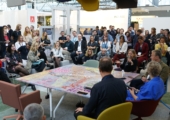August 19, 2015
Home-workers are happier, healthier and more productive than ever 0
 Home-workers are more productive, happier and more capable of attaining a healthy work/life balance than those who work in an office, claims a new survey. Around 84 percent of home-workers believe they are equally or more productive then their office-based colleagues; and over three quarters (77 percent) of the UK’s working population agree that working from home has a positive impact on productivity. The survey of 1,800 professionals from CV library found that 18 percent work from home, with a further 15 percent splitting their time between home and the office, and the data shows that flexible working hours contributes to increased productivity (28 percent and 26 percent respectively). Although well over half (66 percent) of home-workers believe they work longer hours, more than three quarters (83.2 percent) find it easier to manage a good work/life balance.
Home-workers are more productive, happier and more capable of attaining a healthy work/life balance than those who work in an office, claims a new survey. Around 84 percent of home-workers believe they are equally or more productive then their office-based colleagues; and over three quarters (77 percent) of the UK’s working population agree that working from home has a positive impact on productivity. The survey of 1,800 professionals from CV library found that 18 percent work from home, with a further 15 percent splitting their time between home and the office, and the data shows that flexible working hours contributes to increased productivity (28 percent and 26 percent respectively). Although well over half (66 percent) of home-workers believe they work longer hours, more than three quarters (83.2 percent) find it easier to manage a good work/life balance.

































August 18, 2015
That story about sexist air conditioning systems…roundly debunked 0
by Mark Eltringham • Comment, Facilities management, Wellbeing, Workplace
The main story of the silly season so far has been that one about the inherent sexism of air conditioning systems from a week or two back. Based on a study published in the esoteric journal Nature Climate Change, it appeared that standards for heating and ventilation in building systems were founded on the metabolic rate of an average man which suggested women were toiling away in unconducive, if not exactly unbearable, conditions. This was a compelling tale picked up worldwide by major media outlets including The New Yorker and The Daily Telegraph. There were only two problems with it all. Firstly, the original study was extremely flimsy, based on a tiny sample and ignorant of some basic facts. Secondly the science behind it has now been roundly rejected by ASHRAE, the main US body responsible for informing debate on such matters.
(more…)